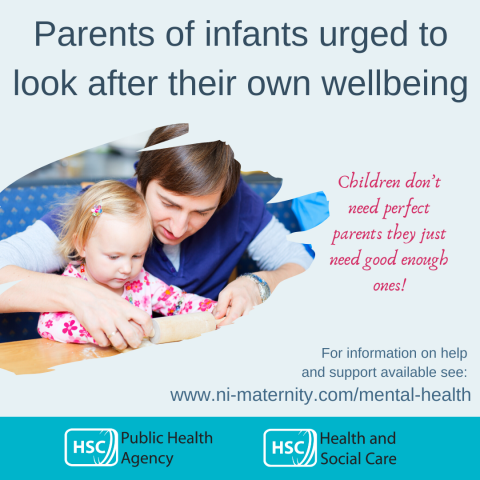Parents of infants urged to look after their own wellbeing

The Public Health Agency (PHA) is reminding parents to be kind to themselves during the COVID-19 pandemic, and in turn they will be helping to protect their infant’s mental health.
Infant mental health is the term used to describe the capacity of a child, during the first three years of life.
It is the capacity to:
- form close relationships;
- recognise and express emotions; and
- explore and learn about their environment.
Deirdre McAliskey, from National Children’s Bureau in Northern Ireland, said: “During pregnancy and infancy, it is obvious how physically reliant babies are on their parents and caregivers. They are also socially and emotionally connected to us. The way we interact with babies and infants shapes their brain development. This occurs particularly during pregnancy, and continues up to the age of three years, when our brains are growing at the fastest rate.
“We now know that ‘mirror neurons’ in the brain mean that how we act and interact with our children explains their ‘copy-cat’ behaviours. It all sounds like a huge responsibility but in fact, it’s the small, day-to-day interactions with babies and infants that make the greatest difference.”
Babies explore the world around them to see what happens, how things work, and where they fit in. They cry, smile, make eye contact, babble, or stretch out arms. In return parents offer physical touch and comfort, calm tone of voice, eye contact, smiles, repeated words, and praise. When the response is positive and meet their needs, babies develop trust, attachment, and confidence in their parents.
Pregnancy and early parenthood can be exhausting, at the best of times never mind during the challenging circumstances of COVID-19. Trying to meet the constant demands of your children during lockdown means intense feelings are inevitable. It’s the ability to repair when things go wrong, with a hug or cuddle by soothing pain, hurt, or anxiety that makes the difference. Being consistent and predictable in our responses most of the time is a positive.Maurice Meehan, Head of Health Improvement for the Northern area at the PHA, said: “
Parents need support to meet the challenges of parenthood, particularly during this time, when our extended support networks are not physically available. It is even more important than ever to be kind to ourselves, and acknowledge difficult feelings. If your mood is persistently low and you are more tearful or irritable than is manageable, ask for help from your midwife, GP, or health visitor as early as possible.
Parents of babies in neonatal or other in-patient units, face specific challenges during this time. Talk to your child’s nursing team about support available for parents.
Anxiety and depression can affect anyone at any time. That includes dads too. The earlier you get help the better.
For further information on support available see: www.ni-maternity.com/mental-health
Useful links:
- Free access to Solihull Approach antenatal course Getting Ready for Baby: https://inourplace.heiapply.com/online-learning/ Use access code: NIBABIES
- Association of Infant Mental Health UK’s short clip video series on Getting to Know Your Baby: https://aimh.org.uk/getting-to-know-your-baby/
- Tiny Life premature baby charity for Northern Ireland: http://www.tinylife.org.uk/
- www.bbc.co.uk/tiny-happy-people
- Infant Mental Health Framework for Northern Ireland: www.publichealth.hscni.net/publications/infant-mental-health-framework-northern-ireland
- A guide to looking after the mental health of you and your baby: www.aware-ni.org/images/AWARE_Guide_to_looking_after_the__Mental_health_of_you_and_your__baby_002.pdf
